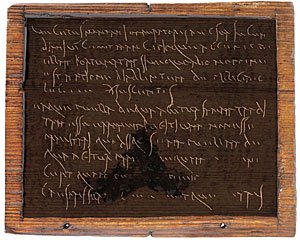








|
|
Daily
Telegraph
Receipt for girl reveals Roman slave secrets
David Derbyshire
March 22nd, 2003
The first evidence of Roman Britain's slave trade has
been unearthed: a receipt for a young French girl bought for the
equivalent price of a small sports car today.
Faint scratchings on a wooden writing tablet show that a
wealthy slave working for the imperial household bought a girl named
Fortunata (Lucky), a member of a Celtic tribe living on the borders of
Normandy and Brittany. The silver-fir tablet had been preserved in wet
London soil for 2,000 years.
‘Vegetus, assistant slave of Montanus the slave
of the August Emperor, has bought the girl Fortunata, by nationality
a Diablintian (from near Jublains in France), for 600 denarii. She
is warranted healthy and not liable to run away ...’ |

The tablet found
|
Although many Roman slaves were forced to work in mines
or on farms, others had relatively high status. Those with a good
education were given paid jobs helping to run estates and households for
the wealthy. Many became rich enough to buy their own slaves - and their
freedom by their thirties.
The 5.5in by 4.5in tablet, found at a City building site,
shows that Fortunata cost 600 dinarii, two years' salary for a Roman
soldier. The deed, written around AD80, states that she was "warranted
healthy and not liable to run away".
The girl was bought by Vegetus, an assistant slave owned
by Montanus, who in turn was owned by the emperor. They were both
officials in London. As a slave, Vegetus could not technically own
property, but in practice Fortunata would have been regarded as one of his
personal possessions, possibly a concubine.
Francis Grew, of the Museum of London where the tablet is
on display, said it was the first deed of sale for a slave found in
Britain.
"This is hugely important," he said. "This
was a very special slave, bought in very special circumstances right
inside the emperor's house. It is a bit like a certificate of employment
for a modern royal butler."
The name of the emperor is not mentioned on the tablet,
but the titles used suggest that he was either Domitian or Trajan.
Fortunata's previous owner is named as Albicianus.
Because only one name is given, he is unlikely to have been a Roman
citizen.
Despite their many technical advances, the Romans had not
invented paper.
In the southern empire, papyrus was used for record
keeping, letters and books. In the north, where papyrus was not easily
available, the Romans wrote on tablets, using a metal stylus to scratch
words in black wax.
Important tablets were strung together and folded to
protect the wax inside. A copy was fixed to the outside before they were
bound with string and seven wax seals.
"It was a little like a car log book," Mr Grew
said. "If there was a sale, you could open it up and check whether
the wax on the outside had been tampered with."
Although the wax had long since perished, faint scratches
on the wood were enhanced and interpreted by scholars at Oxford
University.
David Miles, chief archaeologist at English Heritage,
said: "It is unusual to find one with such clear engraving into the
wood. The writer must have been very heavy-handed."

|




